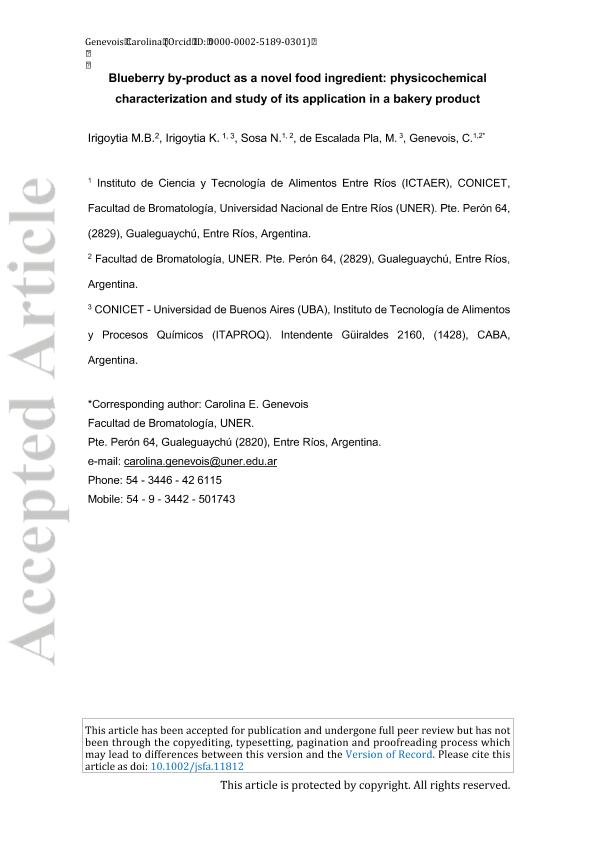Mostrar el registro sencillo del ítem
dc.contributor.author
Irigoytia, Maria Belén
dc.contributor.author
Irigoytia, Karen Florencia

dc.contributor.author
Sosa, Natalia

dc.contributor.author
de Escalada Pla, Marina Francisca

dc.contributor.author
Genevois, Carolina Elizabeth

dc.date.available
2023-06-12T13:13:12Z
dc.date.issued
2022-08
dc.identifier.citation
Irigoytia, Maria Belén; Irigoytia, Karen Florencia; Sosa, Natalia; de Escalada Pla, Marina Francisca; Genevois, Carolina Elizabeth; Blueberry by-product as a novel food ingredient: physicochemical characterization and study of its application in a bakery product; John Wiley & Sons Ltd; Journal of the Science of Food and Agriculture; 102; 11; 8-2022; 4551-4560
dc.identifier.issn
0022-5142
dc.identifier.uri
http://hdl.handle.net/11336/200232
dc.description.abstract
BACKGROUND: Industrial blueberry juice processing results in a significant amount of by-product, the so called pomace, which could represent a nutritionally valuable source of fibre and bioactive compounds to enhance either technological or nutritional characteristics of foods. The aim of this study was to obtain novel ingredients based on blueberry by-product, applying different drying methods: convective (CD), freeze drying (FD) and vacuum drying (VD). The powders were physicochemically, functionally and nutritionally characterized. Finally, its application to formulate muffins in replacing 10–20–30% of wheat flour was studied to evaluate the effect on textural, colour and sensorial characteristics. RESULTS: CD reduced the hydration and functional properties when compared to FD and VD. The powders were characterized by a high content of dietary fibre (273 ± 5 g kg−1) and good retention and bioaccessibility of antioxidant compounds (39–85% range). The powder addition to formulate muffin decreased lightness and chromaticity, without differences due to the drying process. The texture parameters were reduced with 10% of ingredient addition; meanwhile, 20–30% showed similar values to the muffin control. Sensorial evaluation presented good overall acceptability (>6 ± 2 on a 9-point hedonic scale) and some specific attributes showed a significant drop in overall acceptability, recommending its optimization according to penalty analysis. CONCLUSION: These results suggest that functional ingredients rich in fibre and bioactive compounds may be obtained from an industrial by-product, giving added value and avoiding or reducing their loss; this could also be a promising vehicle to incorporate dietary fibre and bioactive compounds into bakery goods.
dc.format
application/pdf
dc.language.iso
eng
dc.publisher
John Wiley & Sons Ltd

dc.rights
info:eu-repo/semantics/openAccess
dc.rights.uri
https://creativecommons.org/licenses/by-nc-sa/2.5/ar/
dc.subject
ANTIOXIDANT COMPOUNDS
dc.subject
BERRIES
dc.subject
IN VITRO BIOACCESSIBILITY
dc.subject
INDUSTRIAL JUICE BY-PRODUCTS
dc.subject
MUFFINS
dc.subject.classification
Alimentos y Bebidas

dc.subject.classification
Otras Ingenierías y Tecnologías

dc.subject.classification
INGENIERÍAS Y TECNOLOGÍAS

dc.title
Blueberry by-product as a novel food ingredient: physicochemical characterization and study of its application in a bakery product
dc.type
info:eu-repo/semantics/article
dc.type
info:ar-repo/semantics/artículo
dc.type
info:eu-repo/semantics/publishedVersion
dc.date.updated
2023-06-12T12:26:01Z
dc.journal.volume
102
dc.journal.number
11
dc.journal.pagination
4551-4560
dc.journal.pais
Reino Unido

dc.journal.ciudad
Londres
dc.description.fil
Fil: Irigoytia, Maria Belén. Universidad Nacional de Entre Ríos. Facultad de Bromatología; Argentina
dc.description.fil
Fil: Irigoytia, Karen Florencia. Consejo Nacional de Investigaciones Cientificas y Tecnicas. Centro Cientifico Tecnologico Conicet - Santa Fe. Instituto de Ciencia y Tecnologia de Los Alimentos de Entre Rios. - Universidad Nacional de Entre Rios. Instituto de Ciencia y Tecnologia de Los Alimentos de Entre Rios.; Argentina. Universidad de Buenos Aires. Facultad de Ciencias Exactas y Naturales. Departamento de Industrias. Instituto de Tecnología de Alimentos y Procesos Químicos. Consejo Nacional de Investigaciones Científicas y Técnicas. Oficina de Coordinación Administrativa Ciudad Universitaria. Instituto de Tecnología de Alimentos y Procesos Químicos; Argentina
dc.description.fil
Fil: Sosa, Natalia. Consejo Nacional de Investigaciones Cientificas y Tecnicas. Centro Cientifico Tecnologico Conicet - Santa Fe. Instituto de Ciencia y Tecnologia de Los Alimentos de Entre Rios. - Universidad Nacional de Entre Rios. Instituto de Ciencia y Tecnologia de Los Alimentos de Entre Rios.; Argentina
dc.description.fil
Fil: de Escalada Pla, Marina Francisca. Universidad de Buenos Aires. Facultad de Ciencias Exactas y Naturales. Departamento de Industrias. Instituto de Tecnología de Alimentos y Procesos Químicos. Consejo Nacional de Investigaciones Científicas y Técnicas. Oficina de Coordinación Administrativa Ciudad Universitaria. Instituto de Tecnología de Alimentos y Procesos Químicos; Argentina
dc.description.fil
Fil: Genevois, Carolina Elizabeth. Consejo Nacional de Investigaciones Cientificas y Tecnicas. Centro Cientifico Tecnologico Conicet - Santa Fe. Instituto de Ciencia y Tecnologia de Los Alimentos de Entre Rios. - Universidad Nacional de Entre Rios. Instituto de Ciencia y Tecnologia de Los Alimentos de Entre Rios.; Argentina
dc.journal.title
Journal of the Science of Food and Agriculture

dc.relation.alternativeid
info:eu-repo/semantics/altIdentifier/url/https://onlinelibrary.wiley.com/doi/10.1002/jsfa.11812
dc.relation.alternativeid
info:eu-repo/semantics/altIdentifier/doi/http://dx.doi.org/10.1002/jsfa.11812
Archivos asociados
